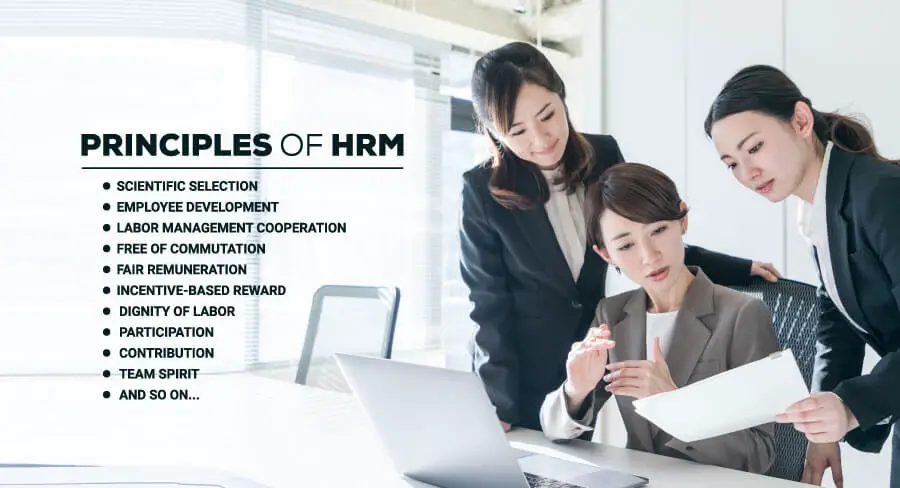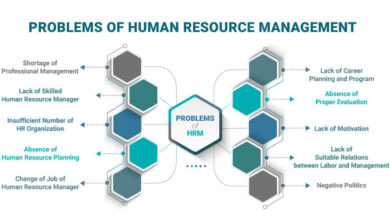Useful 10 Principles of Human Resource Management (HRM)
The HRM department should be the backbone of the organization. They are responsible for the smooth functioning of a business, and they ensure that all employees are happy and satisfied.
The principles of human resource management are the foundations that lead the sector to succeed. With efficient execution, any organization can stay on track and grow well.
10 Principles of Human Resource Management
The policy is a guideline for managerial decisions and actions. Principles are based on truths that are tested and re-tested to ensure their accuracy. Over time, practice, experience, and observation have proven many human resource principles. These truths are generally applicable in all organizations. However, policies usually differ from organization to organization. Principles guide managers in formulating policies, programmers, procedures, and practices, K. Aswathappa has mentioned some human resource principles which are as follows:
- The principle of scientific selection is to select the right person at the right time for the right job.
- The guiding principle of employee development is to provide equal opportunities to all employees to develop their full potential.
- The idea of labor-management cooperation is to promote cordial industrial relations.
- The principles of free flow of commutation are to keep all channels of communication open and encourage upward, downward, horizontal, formal, and informal communication.
- The principle of fair remuneration is to pay fair and equitable wages and salaries commiserating with jobs.
- The idea is to recognize the exemplary performance of its employees and give rewards to them.
- Principal of dignity of labor is to treat every job holder with dignity and respect.
- The principle of participation requires that all levels of the company include employee representatives in their decision-making process.
- To provide prosperity to all employees and to contribute to national prosperity is the higher purpose of our job.
- Promote cooperation and team spirit among employees. When we follow these principles, we will be sure that the organization does a good job of performing all human resource activities.
There may be other principles of human resource management to be followed for the successful performance of all functions. Still, these principles are supposed to be given importance for the development of the human resource activities of an organization. However, Let’s try to understand the issues with a more detailed explanation.

1. Principle of Scientific Selection
The principle of scientific selection is a good one. It means that if you want to get the best job done, you have to make sure that your staff is the best people for it. It means you should put more faith in common sense than in statistics. But if you think this way, it will be hard to motivate your staff.
If they see that they are responsible for their own performance and that there is no one above them telling them what to do, they will take responsibility themselves and do better work. You can’t tell them “This is a job for someone else” and expect results.
2. Principle of Employee Development
The guiding principle of employee development is to provide equal opportunities to all employees to develop their full potential. It is based on the assumption that the employees have equal potential and that they can be developed to achieve the highest level of efficiency.
Employee development is a never-ending process which means that an organization should always be in search of bringing about further improvement in the performance of its workers. This continuous improvement can be brought about by providing opportunities for training and development, education, research, and experimentation in order to provide them with higher skills.
Employee development not only helps individuals but also helps the organization to meet ever-changing needs through the planned growth and development of its workforce. It provides self-development for employees and contributes toward more effective use of human resources.
3. Principle of Labor-Management Cooperation
The principle of labor-management cooperation is to promote cordial industrial relations. It is based on the recognition that the problems of a business concern can be solved with greater success if the management and workers join hands together in an atmosphere of mutual trust and confidence. The management should give due consideration to the views of the workers while framing rules and regulations for their guidance.
Similarly, the workers should also appreciate the difficulties and problems of the management and cooperate with it wholeheartedly without causing any damage to the property of the organization. The principle of labor-management cooperation implies that there should be no room for suspicion and mistrust between them. They should work as partners in trade to achieve common goals for their mutual benefit.
4. Principle of Free of Commutation
This principle is based on the premise that a manager’s communication must not be blocked. This principle means that all channels of communication should be kept open and encouraged upward, downward, horizontal, formal, and informal communication.
A manager will be able to obtain more useful information from his subordinates if he takes the initiative in maintaining an open channel of communication. The manager should encourage his subordinates to communicate with him freely and frequently. Also, subordinates should feel free to communicate with their superiors without any hesitation or fear. In this way, the manager will know what is going on in the organization through two-way communication.
5. Principles of Fair Remuneration
Pay is a function of factors such as the cost of living, supply and demand for workers in certain occupations, and the ability of the organization to pay. Pay also may be affected by market forces. Pay systems must be consistent with the objectives and strategies of the organization, legal requirements, and with what is fair and equitable.
There are several different approaches to developing pay rates. The most widely used methods are:
- Job evaluation,
- Survey of wages paid by other employers for similar jobs,
- Cost-of-living adjustments (COLA),
- Pay policies that take into account seniority or merit increases.
6. Principles of Incentive-based Reward
An incentive-based reward is one of the principles of HRM. It is a comprehensive pay system in which the rewards that employees receive are based on their performance and achievement of organizational goals. In other words, the company pays its employees according to the results that they produce. The idea is to recognize the exemplary performance of its employees and give rewards to them.
The form of rewards can be monetary or nonmonetary. A monetary reward can be in the form of a percentage of profit or a bonus based on sales, while a nonmonetary reward could include an extra day off, special privileges like parking space, and many other things.
In other words, incentive rewards are designed to motivate people to perform better by providing them with financial assistance or recognition.
7. Principles of Dignity of Labor
The objective of HRM is to provide a congenial atmosphere for work by maintaining the dignity of labor. The most important principle of HRM is to respect the dignity of laborers. Workers are the backbone of any organization. They are not just only a human resource but also a valuable resource. The real credit for any achievement goes to them. So every attempt should be made to maintain their dignity and give them respect. It is very necessary to create an atmosphere in which there is no distinction between senior employees and junior employees and workers with respect to job level, age, position, or grade.
It helps in creating job satisfaction among workers. A worker who feels valued, respected, and happy is more productive than a worker who does not. He will perform his duties with more devotion and sincerity which will ultimately lead to the success of the organization.
8. Principle of Participation
The principle of participation in HRM is the most important principle of HRM, and the most difficult to implement. It requires that all levels of the company include employee representatives in their decision-making process.
The principle of participation in HRM is the most important principle of HRM, and the most difficult to implement. It requires that all levels of the company include employee representatives in their decision-making process.
An example of this would be an employee representative on a hiring committee. The representative will not only provide insight into what qualities employees want in a new hire but also help to reduce conflict between management and employees by being part of the process.
9. Principle of Contribution
The purpose of our job is to provide prosperity to all employees and to contribute to national prosperity. The principle of contribution is the basic principle that all our activities should be based on.
Under this principle, we have established a management philosophy under the key phrase “work together and work hard”, which is the source of the strength that has allowed us to grow healthily and steadily into a company we can all be proud of.
We will continue to grow as a company that contributes to society by expanding our business. We will also continue to grow as a company that contributes to society by expanding our business.
10. Principle of Team Spirit
Promote cooperation and team spirit among employees. Thus, employees feel connected to the organization and enjoy greater job satisfaction. When we follow these principles, we will be sure that the organization does a good job of performing all human resource activities.
The principle of cooperation in HRM helps establish cordial relationships between employers and employees. This relationship is established through communication, consultation, and participation in decision-making.
Conclusion
Human Resource Management (HRM) is very important in any organization. It helps people work together, and it makes sure that workers at different levels of an organization get along. All the principles of Human Resource Management or the principles of HRM try to make sure that all employees are happy and feel secure about their jobs.



